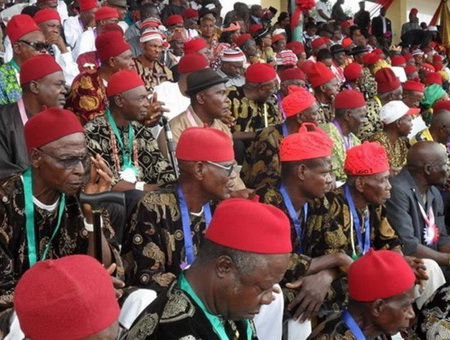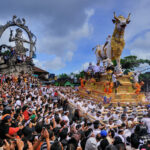The Igbo people are one of Nigeria’s most prominent ethnic groups, with a history that spans thousands of years. They have a rich cultural heritage, known for their contributions to Nigeria’s social, political, and economic life. In this essay, we will explore the history of the Igbo from ancient times to the present, highlighting their political structures, economic activities, colonization, the Nigerian Civil War, and their post-war recovery and contemporary significance.
Early History and Origins
The origin of the Igbo people has been a subject of debate among historians, anthropologists, and scholars. There are multiple theories about the origin of the Igbo. One theory suggests that the Igbo people have been indigenous to southeastern Nigeria for thousands of years. Archaeological findings, such as the Nok culture and Ugwuele stone tools, point to advanced societies that existed in the region as far back as 5000 BC. Another theory posits that the Igbo might have migrated from areas around the Nile Valley or Sudan, connecting their origin to ancient civilizations in Egypt or Nubia.
The Igbo lived in a decentralized and highly autonomous structure, unlike other ethnic groups in West Africa, such as the Hausa or the Yoruba, who developed centralized kingdoms. The lack of centralized political power in Igbo society is one of the most distinctive aspects of their early history. Instead, they lived in communities organized around village republics, where decision-making was communal and inclusive, reflecting democratic traditions. Each village had councils of elders and age-grade systems that governed the social, political, and economic aspects of the community. This system was highly adaptable, allowing communities to thrive without the need for kings or queens.
Political Structure and Society
The Igbo political structure was deeply rooted in communal governance. The family unit formed the foundation of the political organization, followed by the village and then the village group. At the family level, the oldest male, known as the “Okpara”, held authority. Several families would form a village, and villages combined to form village groups. Leadership was based on merit and age, and individuals earned respect through achievements in trade, warfare, or diplomacy.
The Igbo practiced a form of direct democracy, where decision-making was carried out in village assemblies, attended by men and sometimes women. In these assemblies, every adult had the right to speak, and decisions were made through consensus. This participatory governance model allowed for the balancing of power and ensured that no single individual or group dominated political affairs.
Religion and Spiritual Life
Religion played a central role in Igbo life, influencing both their social and political structures. The traditional Igbo religion is based on the belief in a supreme god, “Chukwu”, who created the world and governs its affairs. Below Chukwu were a variety of lesser deities, spirits, and ancestors, each playing a specific role in the lives of the people. The Igbo people believed that these deities could be appeased through offerings and sacrifices, ensuring their favor and protection.
An important concept in Igbo religion is “chi”, a personal deity believed to guide an individual’s fate. The Igbo also placed great importance on the veneration of ancestors, believing that deceased family members continued to play a role in the lives of the living, offering guidance and protection.
Religion also impacted Igbo political life, as priests and diviners played significant roles in advising communities on spiritual matters, helping with decision-making, and settling disputes. Oracles, such as the Arochukwu oracle, became renowned not only for religious significance but also as centers of trade and influence.
Pre-Colonial Trade and Economy
The Igbo people were highly enterprising, with a strong tradition of trade and craftsmanship. They were primarily farmers, cultivating yams, cassava, and palm oil, but they also engaged in long-distance trade. The Igbo region was part of the trans-Saharan trade routes, exchanging goods like ivory, textiles, and slaves with other West African peoples and across the continent.
Igbo traders were integral in the network of trade that stretched across Nigeria, linking them with the Hausa to the north and the Yoruba to the west. They also became involved in the Atlantic slave trade, both as victims and as intermediaries. Igbo slaves were transported to the Americas, especially to places like Jamaica and Haiti, where their influence can still be seen in aspects of language, religion, and culture.
The Colonial Period (1885-1960)
European colonization profoundly affected Igbo society, particularly after the British formalized their control over Nigeria following the Berlin Conference of 1884-1885. The British colonial authorities introduced indirect rule, a system of governance that worked relatively well in northern and western Nigeria but clashed with the decentralized nature of Igbo society. The British attempted to impose Warrant Chiefs—men selected by the colonial authorities to serve as rulers—but this system was largely ineffective and met with widespread resistance.
The most famous episode of this resistance is the Aba Women’s Riot of 1929, when thousands of Igbo women protested against the British imposition of taxes and the corrupt practices of the warrant chiefs. This revolt is one of the first major anti-colonial movements in Nigeria and highlighted the Igbo people’s resistance to foreign rule and the importance of women in Igbo society.
Colonization also brought Christianity, which spread rapidly throughout Igbo land. The arrival of Christian missionaries in the 19th century had a significant impact on Igbo traditional religion, leading to a gradual decline in indigenous religious practices. Christianity, however, also brought education, which the Igbo embraced. By the mid-20th century, the Igbo had become one of the most educated and economically progressive ethnic groups in Nigeria, producing numerous civil servants, entrepreneurs, and intellectuals.
The Road to Independence and the Nigerian Civil War (1967-1970)
Nigeria gained independence from Britain in 1960, but the new nation was soon plagued by ethnic tensions, economic disparities, and political instability. The Igbo played a prominent role in the independence movement, with figures such as Nnamdi Azikiwe emerging as national leaders. However, the post-independence political landscape became highly volatile, with deep divisions between Nigeria’s major ethnic groups—the Hausa-Fulani in the north, the Yoruba in the west, and the Igbo in the east.
In 1966, Nigeria experienced a series of coups, the first of which was led by mostly Igbo military officers. Although this coup failed, it exacerbated ethnic tensions, and the resulting counter-coup led to the mass killing of Igbos in northern Nigeria. This violence, coupled with political instability, eventually led to the declaration of an independent Republic of Biafra by Igbo leaders in 1967, triggering the Nigerian Civil War (also known as the Biafran War).
The civil war lasted from 1967 to 1970 and resulted in massive casualties, particularly on the Biafran side. The war was characterized by widespread famine, due in large part to the Nigerian government’s blockade of Biafran territory. By the time the war ended, more than one million people had died, and the Igbo region was devastated. Biafra surrendered in 1970, and Nigeria was reunified under the slogan “No Victor, No Vanquished.”
Post-War Recovery
After the civil war, the Igbo people faced enormous challenges in rebuilding their society. The Nigerian government implemented policies that, while intended to promote reconciliation, often deepened Igbo marginalization. For example, Igbo property in other parts of Nigeria was declared “abandoned” and confiscated. Additionally, the Nigerian government placed limits on the amount of money Igbos could recover from their bank accounts, further stifling their economic recovery.
Despite these obstacles, the Igbo demonstrated remarkable resilience and quickly rebuilt their communities. By the 1980s, Igbo businessmen and traders were once again leading major sectors of the Nigerian economy, particularly in areas such as manufacturing, transport, and commerce. Igbo cities such as Onitsha, Aba, and Enugu became major commercial hubs.
Contemporary Igbo Society
In contemporary Nigeria, the Igbo remain a vital part of the country’s political, economic, and cultural landscape. Although some Igbo continue to express grievances over perceived marginalization, they have contributed significantly to Nigeria’s development in various fields, including education, the arts, politics, and business. The Igbo diaspora is also influential, with many Igbo individuals excelling in countries like the United States, the United Kingdom, and South Africa.
Conclusion
The history of the Igbo in Nigeria is a testament to their resilience, ingenuity, and adaptability. From their ancient roots in southeastern Nigeria to their modern-day contributions, the Igbo people have played a pivotal role in shaping the course of Nigerian history. Despite the challenges posed by colonization, civil war, and post-war recovery, the Igbo have maintained a distinct identity and remain one of the most influential ethnic groups in Nigeria. Today, they continue to be a driving force in Nigeria’s economic and cultural life, with a rich legacy that spans centuries.


